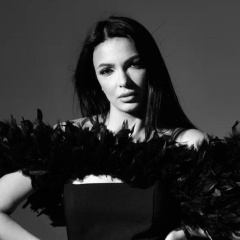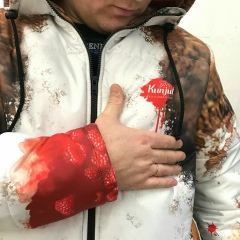66 Facts You May Not Have Known About The English Language
The English language is, quite literally, the greatest language in the world. Great in terms of size - the current edition of the Oxford English Dictionary contains 615,000 entries. Great in terms of scope — it's an official language in seventy-nine countries and territories. And great in terms of, well, greatness — it's just one fantastic mishmash of borrowings, inventions, corruptions, misinterpretations, misspellings, alterations, words you'll never need, and words you never even knew you'll never need.
Since December 2013, @HaggardHawks has been trying to prove precisely this by tweeting odd words, word origins and language facts everyday. 1,300 tweets later, it turns six months old this week and so to celebrate, here are 66 random facts from our first semester that hopefully go some way towards showing how great — and how downright bizarre — the English language can be.
1. In the 17th century, magpies were nicknamed pie-maggots.
2. The part of a wall between two windows is called the interfenestration.
3. If you were to write out every number name in full (one, two, three, four...), you wouldn't use a single letter B until you reached one billion.
4. The part of your back that you can't quite reach to scratch is called the acnestis. It's derived from the Greek word for "cheese-grater."
5. A hecatompedon is a building measuring precisely 100ft × 100ft.
6. A growlery is a place you like to retire to when you're unwell or in a bad mood. It was coined by Charles Dickens in Bleak House (1853).
7. There was no word for the color orange in English until about 450 years ago.
8. The infinity sign, ∞, is called a lemniscate. Its name means "decorated with ribbons" in Latin.
9. A Dutch feast is one at which the host gets drunk before his hosts do.
10. Schoolmaster is an anagram of "the classroom."
11. To explode originally meant "to jeer a performer off the stage."
12. Funk was originally a Tudor word for the stale smell of tobacco smoke.
13. In written English, only one letter in every 510 is a Q.
14. The opposite of déjà-vu is called jamais-vu: it describes the odd feeling that something very familiar is actually completely new.
15. A scissor was originally a type of Roman gladiator thought to have been armed either with a pair of swords or blades, or with a single dual-bladed dagger.
16. To jirble means "to spill a liquid while pouring it because your hands are shaking."
17. Samuel Johnson defined a sock as "something put between the foot and the shoe."
18. In Victorian slang, muffin-wallopers were old unmarried or widowed women who would meet up to gossip over tea and cakes.
19. Scarecrows were once known as hobidy-boobies.
20. The longest English word with its letters in reverse alphabetical order is spoonfeed.
21. Shakespeare used the word puking in As You Like It.
22. Flabellation is the use of a fan to cool something down.
23. Bamboozle derives from a French word, embabouiner, meaning "to make a baboon out of someone."
24. A percontation is a question that requires more than a straightforward "yes" or "no" answer.
25. The shortest -ology is oology, the scientific study of eggs.
26. As a verb rather than a noun, owl means "to act wisely, despite knowing nothing."
27. A shape with 99 sides would be called an enneacontakaienneagon.
28. In the 18th century, a clank-napper was a thief who specialized in stealing silverware.
29. Noon is derived from the Latin for "ninth," novem. It originally referred to the ninth hour of the Roman day — 3pm.
30. 11% of the entire English language is just the letter E.
31. Oysterhood means "reclusiveness," or "an overwhelming desire to stay at home."
32. A puckfist is someone who braggingly dominates a conversation.
33. The bowl formed by cupping your hands together is called a gowpen.
34. To battologize means "to repeat a word so incessantly in conversation that it loses all meaning and impact."
35. A zoilist is an unfair or unnecessarily harsh critic, or someone who particularly enjoys finding fault in things.
36. In 19th century English, a cover-slut was a long cloak or overcoat worn to hide a person's untidy or dirty clothes underneath.
37. Happy is used three times more often in English than sad.
38. Trinkgeld is money meant only to be spent on drink.
39. Aquabob is an old name for an icicle.
40. In the 16th and 17th century, buttock-mail was the name of a tax once levied in Scotland on people who had sex out of wedlock.
41. Witzelsucht is a rare neurological disorder whose sufferers have an excessive tendency to tell pointless stories or inappropriate jokes and puns.
42. A repdigit is a number comprised of a series of repeated numbers, like 9,999.
43. In Tudor English, a gandermooner was a man who flirted with other women while his wife recovered from childbirth.
44. A cumberground is an utterly useless person who literally serves no other purpose than to take up space.
45. Sermocination is the proper name for posing a question and then immediately answering it yourself.
46. The earliest known reference to baseball in English comes from Jane Austen's Northanger Abbey (1798).
47. Whipper-tooties are pointless misgivings or groundless excuses for not trying to do something.
48. Anything described as transpontine is located on the opposite side of a bridge.
49. In the early days of Hollywood, the custard pies thrown in comedy sketches were nicknamed magoos.
50. Checkbook is the longest horizontally symmetrical word in the English language — although if proper nouns are included, Florida's Lake Okeechobee is one letter longer.
51. The earliest record of the phrase "do-it-yourself" comes from a 1910 magazine article about students at Boston University being left to teach themselves.
52. The paddywhack mentioned in the nursery rhyme "This Old Man" is a Victorian slang word for a severe beating.
53. The Kelvin temperature scale, the forsythia plant, Boeing aircraft and the state of Pennsylvania are all named after people called William.
54. Xenoglossy is the apparent ability to speak a language that you've never actually learned.
55. Mochas are named after a port in Yemen, from where coffee was exported to Europe in the 18th century.
56. In mediaeval Europe, a moment was precisely 1/40th of an hour, or 90 seconds.
57. To quomodocunquize means "to make money by whatever means possible."
58. Porpoise literally means "pork-fish."
59. Shivviness is an old Yorkshire word for the uncomfortable feeling of wearing new underwear.
60. The adjectival form of abracadabra is abracadabrant, used to describe anything that has apparently happened by magic.
61. Straitjackets were originally called strait-waistcoats.
62. Aspirin and heroin were both originally trademarks. They lost their trademark status as part of the Treaty of Versailles.
63. An autological word is one that describes itself — like short or unhyphenated.
64. In the 18th century, teachers were nicknamed "haberdashers of pronouns."
65. The burnt or used part of a candlewick is called the snaste.
66. The expressions "bully pulpit" and "lunatic fringe" were coined by Theodore Roosevelt.
The English language is, quite literally, the greatest language in the world. Great in terms of size - the current edition of the Oxford English Dictionary contains 615,000 entries. Great in terms of scope — it's an official language in seventy-nine countries and territories. And great in terms of, well, greatness — it's just one fantastic mishmash of borrowings, inventions, corruptions, misinterpretations, misspellings, alterations, words you'll never need, and words you never even knew you'll never need.
Since December 2013, @HaggardHawks has been trying to prove precisely this by tweeting odd words, word origins and language facts everyday. 1,300 tweets later, it turns six months old this week and so to celebrate, here are 66 random facts from our first semester that hopefully go some way towards showing how great — and how downright bizarre — the English language can be.
1. In the 17th century, magpies were nicknamed pie-maggots.
2. The part of a wall between two windows is called the interfenestration.
3. If you were to write out every number name in full (one, two, three, four...), you wouldn't use a single letter B until you reached one billion.
4. The part of your back that you can't quite reach to scratch is called the acnestis. It's derived from the Greek word for "cheese-grater."
5. A hecatompedon is a building measuring precisely 100ft × 100ft.
6. A growlery is a place you like to retire to when you're unwell or in a bad mood. It was coined by Charles Dickens in Bleak House (1853).
7. There was no word for the color orange in English until about 450 years ago.
8. The infinity sign, ∞, is called a lemniscate. Its name means "decorated with ribbons" in Latin.
9. A Dutch feast is one at which the host gets drunk before his hosts do.
10. Schoolmaster is an anagram of "the classroom."
11. To explode originally meant "to jeer a performer off the stage."
12. Funk was originally a Tudor word for the stale smell of tobacco smoke.
13. In written English, only one letter in every 510 is a Q.
14. The opposite of déjà-vu is called jamais-vu: it describes the odd feeling that something very familiar is actually completely new.
15. A scissor was originally a type of Roman gladiator thought to have been armed either with a pair of swords or blades, or with a single dual-bladed dagger.
16. To jirble means "to spill a liquid while pouring it because your hands are shaking."
17. Samuel Johnson defined a sock as "something put between the foot and the shoe."
18. In Victorian slang, muffin-wallopers were old unmarried or widowed women who would meet up to gossip over tea and cakes.
19. Scarecrows were once known as hobidy-boobies.
20. The longest English word with its letters in reverse alphabetical order is spoonfeed.
21. Shakespeare used the word puking in As You Like It.
22. Flabellation is the use of a fan to cool something down.
23. Bamboozle derives from a French word, embabouiner, meaning "to make a baboon out of someone."
24. A percontation is a question that requires more than a straightforward "yes" or "no" answer.
25. The shortest -ology is oology, the scientific study of eggs.
26. As a verb rather than a noun, owl means "to act wisely, despite knowing nothing."
27. A shape with 99 sides would be called an enneacontakaienneagon.
28. In the 18th century, a clank-napper was a thief who specialized in stealing silverware.
29. Noon is derived from the Latin for "ninth," novem. It originally referred to the ninth hour of the Roman day — 3pm.
30. 11% of the entire English language is just the letter E.
31. Oysterhood means "reclusiveness," or "an overwhelming desire to stay at home."
32. A puckfist is someone who braggingly dominates a conversation.
33. The bowl formed by cupping your hands together is called a gowpen.
34. To battologize means "to repeat a word so incessantly in conversation that it loses all meaning and impact."
35. A zoilist is an unfair or unnecessarily harsh critic, or someone who particularly enjoys finding fault in things.
36. In 19th century English, a cover-slut was a long cloak or overcoat worn to hide a person's untidy or dirty clothes underneath.
37. Happy is used three times more often in English than sad.
38. Trinkgeld is money meant only to be spent on drink.
39. Aquabob is an old name for an icicle.
40. In the 16th and 17th century, buttock-mail was the name of a tax once levied in Scotland on people who had sex out of wedlock.
41. Witzelsucht is a rare neurological disorder whose sufferers have an excessive tendency to tell pointless stories or inappropriate jokes and puns.
42. A repdigit is a number comprised of a series of repeated numbers, like 9,999.
43. In Tudor English, a gandermooner was a man who flirted with other women while his wife recovered from childbirth.
44. A cumberground is an utterly useless person who literally serves no other purpose than to take up space.
45. Sermocination is the proper name for posing a question and then immediately answering it yourself.
46. The earliest known reference to baseball in English comes from Jane Austen's Northanger Abbey (1798).
47. Whipper-tooties are pointless misgivings or groundless excuses for not trying to do something.
48. Anything described as transpontine is located on the opposite side of a bridge.
49. In the early days of Hollywood, the custard pies thrown in comedy sketches were nicknamed magoos.
50. Checkbook is the longest horizontally symmetrical word in the English language — although if proper nouns are included, Florida's Lake Okeechobee is one letter longer.
51. The earliest record of the phrase "do-it-yourself" comes from a 1910 magazine article about students at Boston University being left to teach themselves.
52. The paddywhack mentioned in the nursery rhyme "This Old Man" is a Victorian slang word for a severe beating.
53. The Kelvin temperature scale, the forsythia plant, Boeing aircraft and the state of Pennsylvania are all named after people called William.
54. Xenoglossy is the apparent ability to speak a language that you've never actually learned.
55. Mochas are named after a port in Yemen, from where coffee was exported to Europe in the 18th century.
56. In mediaeval Europe, a moment was precisely 1/40th of an hour, or 90 seconds.
57. To quomodocunquize means "to make money by whatever means possible."
58. Porpoise literally means "pork-fish."
59. Shivviness is an old Yorkshire word for the uncomfortable feeling of wearing new underwear.
60. The adjectival form of abracadabra is abracadabrant, used to describe anything that has apparently happened by magic.
61. Straitjackets were originally called strait-waistcoats.
62. Aspirin and heroin were both originally trademarks. They lost their trademark status as part of the Treaty of Versailles.
63. An autological word is one that describes itself — like short or unhyphenated.
64. In the 18th century, teachers were nicknamed "haberdashers of pronouns."
65. The burnt or used part of a candlewick is called the snaste.
66. The expressions "bully pulpit" and "lunatic fringe" were coined by Theodore Roosevelt.
66 фактов, которые вы, возможно, не знали об английском языке
Английский язык, буквально, самый большой язык в мире. Великолепно с точки зрения размера - текущее издание Оксфордского словаря английского языка содержит 615 000 статей. Великолепен с точки зрения охвата - это официальный язык в семидесяти девяти странах и территориях. И великолепно с точки зрения, ну, в общем, величия - это всего лишь одна фантастическая путаница заимствований, изобретений, искажений, неправильных толкований, орфографических ошибок, изменений, слов, которые вам никогда не понадобятся, и слов, которые вы даже никогда не знали, вам никогда не понадобятся.
С декабря 2013 года @HaggardHawks пытается доказать это именно тем, что каждый день пишет в Твиттере странные слова, происхождение слов и языковые факты. 1300 твитов спустя, на этой неделе исполняется шесть месяцев, и поэтому, чтобы отпраздновать, вот 66 случайных фактов из нашего первого семестра, которые, как мы надеемся, каким-то образом покажут, насколько великим - и насколько просто странным - может быть английский язык.
1. В 17 веке сороки получили прозвище пирожки-личинки.
2. Часть стены между двумя окнами называется межфестерацией.
3. Если бы вы записали каждое числовое имя полностью (один, два, три, четыре ...), вы не использовали бы одну букву B, пока не достигли одного миллиарда.
4. Та часть спины, которую вы не можете полностью поцарапать, называется акнестисом. Это происходит от греческого слова «терка для сыра».
5. Гекатомедон - это здание размером точно 100 футов × 100 футов.
6. Овощеводство - это место, где вы предпочитаете выходить на пенсию, когда вы плохо себя чувствуете или у вас плохое настроение. Он был придуман Чарльзом Диккенсом в Холодном доме (1853).
7. До 450 лет назад в английском языке не было названия оранжевого цвета.
8. Знак бесконечности ∞ называется лемнискате. Его название означает «украшенный лентами» на латыни.
9. Голландский пир - это тот, в котором хозяин напивается раньше, чем его хозяева.
10. Школьный учитель - анаграмма «классной комнаты».
11. Взрываться изначально означало «высмеивать исполнителя со сцены».
12. Изначально фанк был тюдоровским словом для запаха табачного дыма.
13. В письменном английском языке только одна буква в каждых 510 является Q.
14. Противоположность дежа-вю называется джамаис-ву: она описывает странное ощущение, что что-то очень знакомое на самом деле совершенно новое.
15. Ножницы изначально были типом римского гладиатора, который, как думали, был вооружен либо парой мечей или клинков, либо одним кинжалом с двумя лезвиями.
16. Дрожать означает «пролить жидкость во время наливания, потому что у вас дрожат руки».
17. Сэмюэл Джонсон определил носок как «нечто, помещенное между ногой и обувью».
18. В викторианском сленге булочки-маффины были старыми незамужними или овдовевшими женщинами, которые встречались, чтобы посплетничать за чаем и пирожными.
19. Чучела были когда-то известны как хобби-сиськи.
20. Самое длинное английское слово с буквами в обратном алфавитном порядке - это подача с ложки.
21. Шекспир использовал слово «рвать, как тебе нравится».
22. Flabellation - это использование вентилятора для охлаждения чего-либо.
23. Bamboozle происходит от французского слова embabouiner, означающего «сделать из кого-то бабуина».
24. Перконтация - это вопрос, который требует большего, чем простой ответ «да» или «нет».
25. Кратчайшая -ология - это оология, научное изучение яиц.
26. Сова как глагол, а не существительное означает «действовать мудро, даже не зная ничего».
27. Форма с 99 сторонами будет называться enneacontakaienneagon.
28. В 18-м веке воробей был вором, который специализировался на краже столового серебра.
29. Полдень происходит от латинского «девятый», novem. Первоначально он относился к девятому часу римского дня - 15:00.
30. 11% всего английского языка - это буква E.
31. Устрица означает «затворничество» или «непреодолимое желание оставаться дома».
32. Шайба - это тот, кто хвастается доминированием в разговоре.
33. Чаша, образованная сложением рук, называется гаупеном.
34. Баттологизировать означает «повторять слово так непрерывно в разговоре, что оно теряет всякий смысл и влияние».
35. Зоилист - это несправедливый или излишне резкий критик или тот, кому особенно нравится находить недостатки в вещах.
36. На английском языке 19-го века шлюха-покров была длинным плащом или пальто, надетым, чтобы скрыть неопрятную или грязную одежду человека.
37. Happy используется в английском языке в три раза чаще, чем sad.
38. Trinkgeld - это деньги, предназначенные только для питья.
39. Аквабоб - старое название сосульки.
40. В 16-м и 17-м веках почтовый ящик был названием налога, который когда-то взимался в Шотландии с людей, которые занимались сексом вне брака.
41. Witzelsucht - это редкое неврологическое расстройство, страдающие от чрезмерной склонности рассказывать бессмысленные истории или неуместные шутки и каламбуры.
42. Репигит - это число, состоящее из серии повторяющихся чисел, например, 9 999.
43. В тюдорском английском гандермунером был мужчина, который флиртовал с другими женщинами, пока его жена выздоравливала после родов.
44. Cumberground - совершенно бесполезный человек, который буквально не преследует никакой другой цели, кроме как занять место
Английский язык, буквально, самый большой язык в мире. Великолепно с точки зрения размера - текущее издание Оксфордского словаря английского языка содержит 615 000 статей. Великолепен с точки зрения охвата - это официальный язык в семидесяти девяти странах и территориях. И великолепно с точки зрения, ну, в общем, величия - это всего лишь одна фантастическая путаница заимствований, изобретений, искажений, неправильных толкований, орфографических ошибок, изменений, слов, которые вам никогда не понадобятся, и слов, которые вы даже никогда не знали, вам никогда не понадобятся.
С декабря 2013 года @HaggardHawks пытается доказать это именно тем, что каждый день пишет в Твиттере странные слова, происхождение слов и языковые факты. 1300 твитов спустя, на этой неделе исполняется шесть месяцев, и поэтому, чтобы отпраздновать, вот 66 случайных фактов из нашего первого семестра, которые, как мы надеемся, каким-то образом покажут, насколько великим - и насколько просто странным - может быть английский язык.
1. В 17 веке сороки получили прозвище пирожки-личинки.
2. Часть стены между двумя окнами называется межфестерацией.
3. Если бы вы записали каждое числовое имя полностью (один, два, три, четыре ...), вы не использовали бы одну букву B, пока не достигли одного миллиарда.
4. Та часть спины, которую вы не можете полностью поцарапать, называется акнестисом. Это происходит от греческого слова «терка для сыра».
5. Гекатомедон - это здание размером точно 100 футов × 100 футов.
6. Овощеводство - это место, где вы предпочитаете выходить на пенсию, когда вы плохо себя чувствуете или у вас плохое настроение. Он был придуман Чарльзом Диккенсом в Холодном доме (1853).
7. До 450 лет назад в английском языке не было названия оранжевого цвета.
8. Знак бесконечности ∞ называется лемнискате. Его название означает «украшенный лентами» на латыни.
9. Голландский пир - это тот, в котором хозяин напивается раньше, чем его хозяева.
10. Школьный учитель - анаграмма «классной комнаты».
11. Взрываться изначально означало «высмеивать исполнителя со сцены».
12. Изначально фанк был тюдоровским словом для запаха табачного дыма.
13. В письменном английском языке только одна буква в каждых 510 является Q.
14. Противоположность дежа-вю называется джамаис-ву: она описывает странное ощущение, что что-то очень знакомое на самом деле совершенно новое.
15. Ножницы изначально были типом римского гладиатора, который, как думали, был вооружен либо парой мечей или клинков, либо одним кинжалом с двумя лезвиями.
16. Дрожать означает «пролить жидкость во время наливания, потому что у вас дрожат руки».
17. Сэмюэл Джонсон определил носок как «нечто, помещенное между ногой и обувью».
18. В викторианском сленге булочки-маффины были старыми незамужними или овдовевшими женщинами, которые встречались, чтобы посплетничать за чаем и пирожными.
19. Чучела были когда-то известны как хобби-сиськи.
20. Самое длинное английское слово с буквами в обратном алфавитном порядке - это подача с ложки.
21. Шекспир использовал слово «рвать, как тебе нравится».
22. Flabellation - это использование вентилятора для охлаждения чего-либо.
23. Bamboozle происходит от французского слова embabouiner, означающего «сделать из кого-то бабуина».
24. Перконтация - это вопрос, который требует большего, чем простой ответ «да» или «нет».
25. Кратчайшая -ология - это оология, научное изучение яиц.
26. Сова как глагол, а не существительное означает «действовать мудро, даже не зная ничего».
27. Форма с 99 сторонами будет называться enneacontakaienneagon.
28. В 18-м веке воробей был вором, который специализировался на краже столового серебра.
29. Полдень происходит от латинского «девятый», novem. Первоначально он относился к девятому часу римского дня - 15:00.
30. 11% всего английского языка - это буква E.
31. Устрица означает «затворничество» или «непреодолимое желание оставаться дома».
32. Шайба - это тот, кто хвастается доминированием в разговоре.
33. Чаша, образованная сложением рук, называется гаупеном.
34. Баттологизировать означает «повторять слово так непрерывно в разговоре, что оно теряет всякий смысл и влияние».
35. Зоилист - это несправедливый или излишне резкий критик или тот, кому особенно нравится находить недостатки в вещах.
36. На английском языке 19-го века шлюха-покров была длинным плащом или пальто, надетым, чтобы скрыть неопрятную или грязную одежду человека.
37. Happy используется в английском языке в три раза чаще, чем sad.
38. Trinkgeld - это деньги, предназначенные только для питья.
39. Аквабоб - старое название сосульки.
40. В 16-м и 17-м веках почтовый ящик был названием налога, который когда-то взимался в Шотландии с людей, которые занимались сексом вне брака.
41. Witzelsucht - это редкое неврологическое расстройство, страдающие от чрезмерной склонности рассказывать бессмысленные истории или неуместные шутки и каламбуры.
42. Репигит - это число, состоящее из серии повторяющихся чисел, например, 9 999.
43. В тюдорском английском гандермунером был мужчина, который флиртовал с другими женщинами, пока его жена выздоравливала после родов.
44. Cumberground - совершенно бесполезный человек, который буквально не преследует никакой другой цели, кроме как занять место
У записи 3 лайков,
1 репостов.
1 репостов.
Эту запись оставил(а) на своей стене Александр Подобаев























